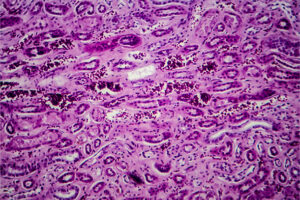Rheumatology
Systemic Lupus Erythematosus
Can Research on Drug-Induced Lupus Erythematosus Shed Light on Autoimmunity?
Overview
While the pathogenesis of drug-induced lupus erythematosus (DILE) is not completely understood, genetic, epigenetic, and environmental influences are believed to be important. The same is true of systemic lupus erythematosus (SLE).
Expert Commentary
George C. Tsokos, MD
|
|
“Hypomethylation and the overexpression of genes of significance are regarded as being important in the pathogenesis of SLE and DILE; however, this area is complex and needs to be appreciated and better understood.”
It has long been recognized that exogenous triggers of lupus flares include ultraviolet light exposure and infections, as well as drugs such as procainamide and hydralazine, which can cause lupus-like autoimmunity in predisposed individuals.
Although the pathophysiology of DILE is unclear, the inhibition of DNA methylation is thought to be contributory in the case of agents such as procainamide and hydralazine. For years, Richardson and colleagues have been interested in the role of DNA methylation as a transcriptionally repressive mechanism in SLE. Early work included a focus on LFA-1, a member of the integrin family of adhesion molecules that is expressed on T cells and other leukocytes.
Hypomethylation and the overexpression of genes of significance are regarded as being important in the pathogenesis of SLE and DILE; however, this area is complex and needs to be appreciated and better understood. Not all genes of significance in SLE are open, or hypomethylated. Some are open and some are closed. For instance, we know that FOXP3 expression is important in regulatory T cells (Treg cells), where FOXP3 supports the Treg cell phenotype. Further, some evidence suggests that the FOXP3 gene may be hypermethylated, or closed, in patients with SLE. To this point, literature published by Sharabi et al explains that inhibiting methylation in a targeted manner increases the number of Treg cells. Additionally, the influence of DNA methylation on double-negative T cells (CD3+CD4−CD8−), a subset of some significance in autoimmune disease, is not fully understood. Suffice it to say, the epigenetic influences in SLE do not appear to be a simple matter of an overexpression of SLE risk genes due to hypomethylation.
Conceptually, in the case of DILE, I would describe the offending drug as something akin to “the straw that breaks the camel’s back.” Even with procainamide and hydralazine, which have some of the highest rates of DILE, most people who are exposed to these medications do not develop DILE. It may be that the patient who does develop DILE already had almost all of the necessary components for SLE in place and just needed one more push in that direction to develop the disease. In the patient who develops SLE without a known insult, all of the pieces are in place and no additional push is needed.
References
Chakraborty P, Mehrotra S. CD38: modulating histone methyltransferase EZH2 activity in SLE. Trends Immunol. 2020;41(3):187-189. doi:10.1016/j.it.2020.01.008
Hanaei S, Sanati G, Zoghi S, Gharibzadeh S, Ziaee V, Rezaei N. The status of FOXP3 gene methylation in pediatric systemic lupus erythematosus. Allergol Immunopathol (Madr). 2020;48(4):332-338. doi:10.1016/j.aller.2020.03.014
He Y, Sawalha AH. Drug-induced lupus erythematosus: an update on drugs and mechanisms. Curr Opin Rheumatol. 2018;30(5):490-497. doi:10.1097/BOR.0000000000000522
Li H, Tsokos GC. Double-negative T cells in autoimmune diseases. Curr Opin Rheumatol. 2021;33(2):163-172. doi:10.1097/BOR.0000000000000778
Lu L, Barbi J, Pan F. The regulation of immune tolerance by FOXP3. Nat Rev Immunol. 2017;17(11):703-717. doi:10.1038/nri.2017.75
Richardson B. Epigenetically altered T cells contribute to lupus flares. Cells. 2019;8(2):127. doi:10.3390/cells8020127
Richardson B, Powers D, Hooper F, Yung RL, O’Rourke K. Lymphocyte function-associated antigen 1 overexpression and T cell autoreactivity. Arthritis Rheum. 1994;37(9):1363-1372. doi:10.1002/art.1780370915
Sharabi A, Tsokos MG, Ding Y, Malek TR, Klatzmann D, Tsokos GC. Regulatory T cells in the treatment of disease. Nat Rev Drug Discov. 2018;17(11):823-844. doi:10.1038/nrd.2018.148
Solhjoo M, Bansal P, Goyal A, Chauhan K. Drug-induced lupus erythematosus. StatPearls. StatPearls Publishing; 2021.











